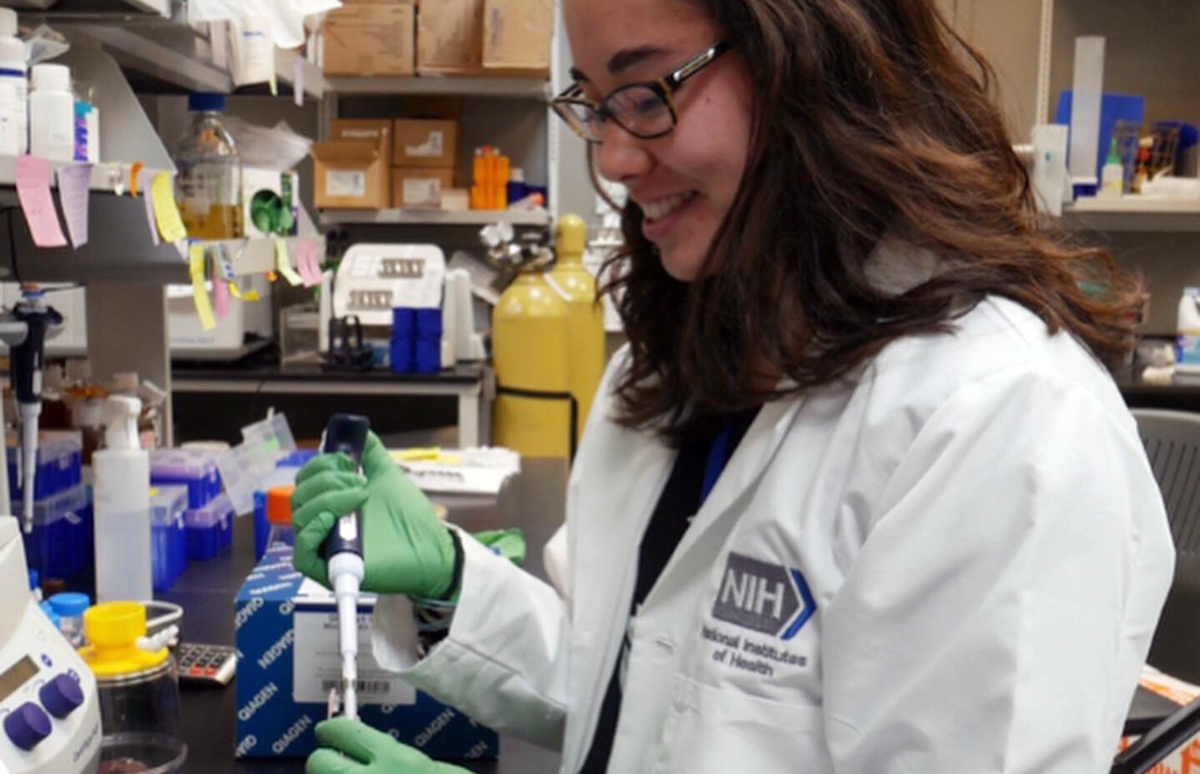For many in the Honors College community, Hannah Calvelli ('20, SAS/HC) immediately comes to mind when you think of HC leaders. From her dedication to service and recognition as an Honors College Changemaker to her time spent as a Mentor-in-Residence, her leadership in the HC Student Wellness Committee, and more, Hannah has made her mark. Considering this, it is no surprise her curiosity and purpose have also propelled her forward in pursuits outside of 5 Seminary Place.
Hannah, who is graduating with highest honors in molecular biology and biochemistry and a minor in criminology, has been conducting research since her freshman year with Dr. Moghe, Provost and Executive Vice Chancellor for Research and Academic Affairs at Rutgers–New Brunswick and Distinguished Professor of Biomedical Engineering. She has been working with the research team to study nanotherapeutics for immune modulation in Parkinson's Disease and has had the opportunity to contribute to several publications.
Last summer, Hannah conducted research at the National Institute for Neurological Disorders and Strokes in Bethesda, Maryland where she received an Exceptional Summer Student Award for her research on reporters of PINK1/Parkin-dependent and independent mitophagy in Dr. Derek Narendra's lab, M.D./Ph.D. Alterations in mitochondrial quality control mechanisms have been implicated in a wide variety of diseases, including age-related disorders such as Parkinson's Disease. Hannah's work may help to gain greater insight into the PINK1/Parkin pathway, the pathogenesis of Parkinson's Disease, and possible therapeutic interventions. Over the course of her summer, Hannah challenged herself by learning new techniques in a small lab setting where she was given a lot of responsibility. One of the most rewarding parts of the experience was Hannah’s ability to see the clinical impact of research while shadowing neurologists at the NIH Clinical Center, where she met patients enrolled in clinical studies for Parkinson's Disease that were being conducted in the labs a few buildings over.
"As a patient, [you] realize how important physician support and honest communication are for [your] care,” Hannah says. That is why, as someone who plans to study medicine, she found her NIH experience particularly valuable.
“The research part is the behind-the-scenes work that eventually translates into an impact on patient lives, so to see both aspects in one place is a really unique opportunity."
"It was definitely challenging work, but very rewarding… for me, the ability to be a lifelong learner is really important. That is one reason why I want to be a doctor. Research also lends itself to that because there is always something new to learn, especially in a field that is rapidly evolving and changing. I have always been a curious person, and I am drawn to the intellectual stimulation of both research and medicine."
Next year, Hannah will be attending medical school, and she hopes to stay involved in research and academia. For Hannah, her interest lies in the “balance between science and humanism that exists in medicine—and leadership at the HC has really shown [me] that humanistic part.”
Outside of the lab, Hannah competes on the Rutgers University Rock Climbing Team. She enjoys that rock climbing is a sport requiring its own degree of problem solving to tackle difficult routes.
Her final advice to first-years?
“Especially at Rutgers, challenge yourself and embrace opportunities for personal growth.”


